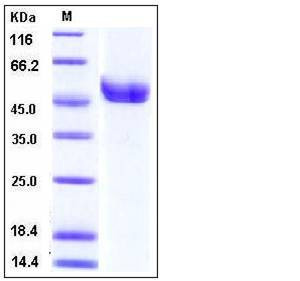Mouse REN1 / Renin-1 Protein (His Tag)
D19352,Ren,Ren-1,Ren-A,Ren1,Ren1c,Ren1d,Rn-1,Rnr
- 100ug (NPP3459) Please inquiry
| Catalog Number | P50279-M08H |
|---|---|
| Organism Species | Mouse |
| Host | Human Cells |
| Synonyms | D19352,Ren,Ren-1,Ren-A,Ren1,Ren1c,Ren1d,Rn-1,Rnr |
| Molecular Weight | The recombinant mouse REN1 consists of 392 amino acids and has a predicted molecular mass of 43.2 kDa. As a result of glycosylation, the apparent molecular mass of rmREN1 is approximately 48-55 kDa in SDS-PAGE under reducing conditions. |
| predicted N | Leu 22 |
| SDS-PAGE |  |
| Purity | > 97 % as determined by SDS-PAGE |
| Protein Construction | A DNA sequence encoding the pro form of mouse REN1 (NP_112469.1) (Met 1-Arg 402) was fused with a polyhistidine tag at the C-terminus. |
| Bio-activity | 1. Measured by its ability to cleave the fluorogenic peptide substrate 5FAM/QXL™ 520 (PetiPeterdi, J. et al., 2009, Physiology 24:88.). The specific activity is > 20 pmoles/min/μg. 2. Immobilized mouse REN1-His (P 50279-M08H) at 10ug/ml (100 μl/well) can bind biotinylated human AGT-His (P 10994-H08H) with a linear range of 31.25-250 ng/ml. |
| Research Area | Cardiovascular |Blood |Other in Blood |
| Formulation | Lyophilized from sterile PBS, pH 7.4 1. Normally 5 % - 8 % trehalose and mannitol are added as protectants before lyophilization. Specific concentrations are included in the hardcopy of COA. |
| Background | Mouse Renin-1, also known as Ren-1, Angiotensinogenase and Kidney renin, is a member of the peptidase A1 family. Renin-1 is synthesized by the juxtaglomerular cells of the kidney in response to decreased blood pressure and sodium concentration. androgen and thyroid hormones influence levels of Renin-1 in mouse submandibular gland (SMG) primarily by regulating the amount of Renin-1 mRNA available for translation. Renin-1 is a highly specific endopeptidase, whose only known function is to generate angiotensin I from angiotensinogen in the plasma, initiating a cascade of reactions that produce an elevation of blood pressure and increased sodium retention by the kidney. It is expressed at relatively low levels in mouse SMG and kidney. Ren-2 is expressed at high levels in the mouse SMG and at very low levels, if at all, in the kidney. Ren-1 and Ren-2 are closely linked on mouse chromosome 1, show extensive homology in coding and noncoding regions and provide a model for studying the regulation of gene expression. |
| Reference |
